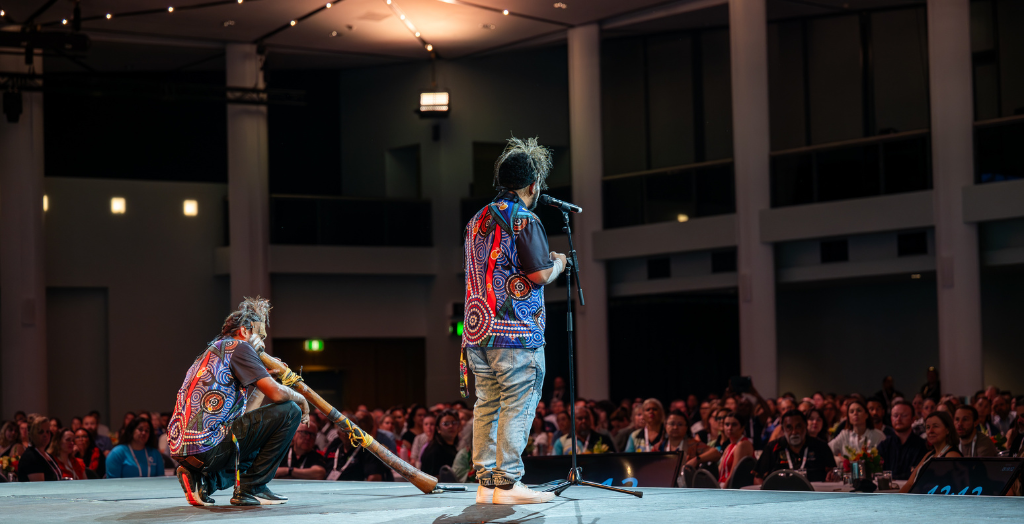There are many ways to appropriately Acknowledge Country or Welcome to Country, so it is key to learn and understand the differences between them, and why they are important.
Incorporating Acknowledgement of Country and Welcome to Country into meetings, gatherings, and events shows respect by upholding Aboriginal and Torres Strait Islander cultural protocols.
Taking the time to Acknowledge Country, or including a Welcome to Country at an event, reminds us that every day we live, work, and dream on Aboriginal and Torres Strait Islander lands.
Welcome to Country

Protocols for welcoming visitors to Country have always been a part of Aboriginal and Torres Strait Islander cultures. Boundaries were clear, and crossing into another group’s Country required a request for permission to enter.
When permission was granted the hosting group would welcome the visitors, offering them safe passage and protection of their spiritual being during the journey. Visitors had to respect the protocols and rules of the land owner group while on their Country.
Today, while these protocols have been adapted to contemporary circumstances, the essential elements remain: welcoming visitors and respect for Country.
Welcome to Country is delivered by Traditional Owners, or Aboriginal and Torres Strait Islander peoples who have been given permission from Traditional Owners, to welcome visitors to their Country.
Your local Aboriginal Land Council or Native Title representative body can advise on organising a Welcome to Country by a Traditional Owner in your area.
Welcome to Country occurs at the beginning of a formal event and can take many forms including singing, dancing, smoking ceremonies, and/or a speech.
Traditional owners are not welcoming people to Australia, they are welcoming to the land within their cultural boundaries which their ancestors have cared for, and lived on, for millennia.
Acknowledgement of Country
An Acknowledgement of Country is an opportunity for anyone to show respect for Traditional Owners and the continuing connection of Aboriginal and Torres Strait Islander peoples to Country.
An Acknowledgement of Country can be offered by any person and like a Welcome to Country, is given at the beginning of a meeting, speech or event.
There is no specific wording for an Acknowledgement of Country, just be sincere and, if possible, do some research on the Country you are acknowledging.
Suggested wording could include:
I’d like to begin by acknowledging the Traditional Owners of the land on which we meet today. I would also like to pay my respects to Elders past and present.
I’d like to begin by acknowledging the Traditional Owners of the land on which we meet today, the (people) of the (nation) and pay my respects to Elders past and present.
Aboriginal and Torres Strait Islander peoples may also wish to acknowledge their own mob/s and other First Nations peoples present.
An Acknowledgement of Country can be expressed on behalf of an organisation in different forms of communications, such as email signature blocks, websites, and on social media, for example:
Reconciliation Australia acknowledges the Traditional Owners of Country throughout Australia. We pay our respects to Elders past and present.
Acknowledgement of Country can be adapted and expanded to reflect different contexts. For example an author might acknowledge that Aboriginal and Torres Strait Islander peoples are the land’s first storytellers; or a meeting of scientists might Acknowledge the contributions and sophistication of First Nations knowledges.
The AIATSIS Map of Indigenous Australia provides further information on Traditional Owners. You can also consult with local First Nations organisations or Land Councils.
Why Acknowledging Country is important
Aboriginal and Torres Strait Islander peoples have experienced a long history of exclusion from Australian history books, the Australian flag, the Australian anthem and for many years, Australian democracy.
This history of dispossession and colonisation lies at the heart of the disparity between Aboriginal and Torres Strait Islander and other Australians today.
Including recognition of Aboriginal and Torres Strait Islander peoples in events, meetings and national symbols contributes to ending the exclusion that has been so damaging.
Incorporating welcoming and acknowledgement protocols into official meetings and events recognises Aboriginal and Torres Strait Islander peoples as the Traditional Owners of land and shows respect.
Acknowledging Country online and at home
There are many different ways to Acknowledge and respect Country virtually, including on social media, from your home, or at your school.
Some suggestions for respecting Country virtually include:
At Home
- Record your Acknowledgement of Country via video
- Take a photo of you, friends, or family with the name of the Traditional Owners, or a sign of Acknowledgement
- Make chalk art or signs on your driveway and upload photos or video.
At Work
- Record a video message at your workplace or a create a photo Acknowledgement
- Ask and encourage your colleagues to take part to create a collage or compilation
- If working remotely, host a zoom meeting with colleagues and ask everyone to hold a sign Acknowledging the Land they are working/living on, or add that detail into chat.
At School
- Create paintings, drawings or signs with your students and upload photos or video
- Create video messages or photos and encourage teachers and staff to get involved.
The distinction between ‘country’ and ‘Country’
In Aboriginal and Torres Strait Islander cultures, the meaning of Country is more than just ownership or connection to land, as Professor Mick Dodson explains:
When we talk about traditional ‘Country’…we mean something beyond the dictionary definition of the word. …we might mean homeland, or tribal or clan area and we might mean more than just a place on the map. For us, Country is a word for all the values, places, resources, stories and cultural obligations associated with that area and its features. It describes the entirety of our ancestral domains. While they may all no longer necessarily be the title-holders to land, Aboriginal and Torres Strait Islander Australians are still connected to the Country of their ancestors and most consider themselves the custodians or caretakers of their land.



